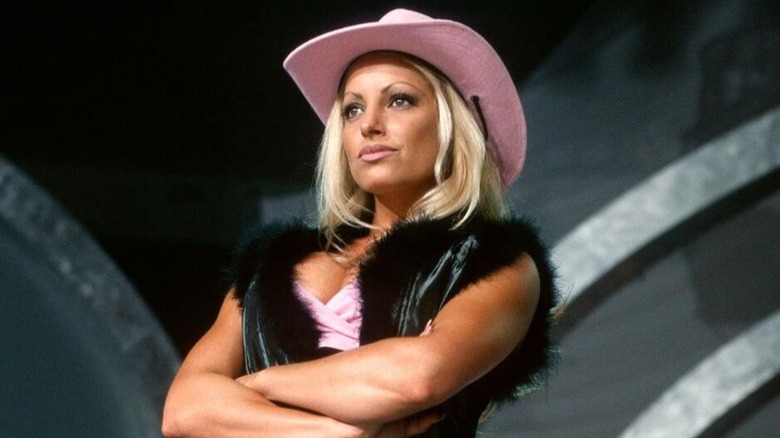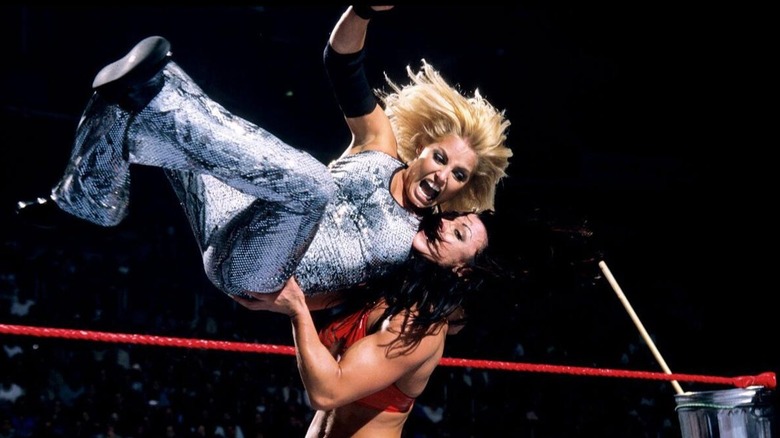Trish Stratus Says Former WWE Boss Vince McMahon 'Hounded' Her About Playboy Shoot
Had wrestlers like Trish Stratus not paved the way for most to travel now by laying the first brick of proving that women are more than just pretty faces in this industry, the evolution of women's wrestling would have never excelled past hair-pulling and cat fights. Of course, many growing up during the Attitude and Ruthless Aggression eras will remember the seven-time WWE Women's Champion as the blueprint standard of indulgence. However, when push came to shove by the former Executive Chairman and CEO Vince McMahon for Stratus to pose for Playboy, she refused. The "Stratusfaction" star explains her controversial decision as to why she refused to cave despite the mounting pressure.
"So, when Playboy came [up], I was absolutely not interested," the Hall of Famer told the cast of "Pod Meets World." "Vince – oh my God, [he] hounded me like crazy. He's like, 'It's [a] great opportunity...' I do not regret [not doing] it. It's just not my thing. And now, my God, now that I've [got] kids and everything, I couldn't even imagine, to be honest. So, no, that is my decision. I stand by it."
Trish Stratus On Changing The Course Of Women's Wrestling Via The 'Puppies' Chants
Despite the conversation of turning down Playboy backstage, the fans' thirst for women's wrestling at that time was at an all-time high. Rather than taking the women's matches as seriously as the men's, it was all about how many unified voices in the audience could coerce the women enough to show their "puppies." Embarrassed by the chants, Stratus recalls how those moments turned into stepping stones in her career, with hopes that she could break barriers with others within the locker room and "re-program" the audience by adding in more athletic moves that moved past sexualized expectations.
"I remember there's a turning point. I remember we started wrestling a little bit more," Stratus recalled."We thought, we're gonna trade those ... slaps and the hair pulls for punches and for chops. We were kind of reprogramming the audience to expect that from [us]. ...Believe me, backstage, there was producers going, 'Yeah, people don't want to see women punch each other. They want to see hair pulling. They want to see cat fighting. They don't want to see that from the girls.'"
As one of the foremothers of the "sorry, not sorry" movement they were about to embrace, the Hall of Famer remembers and acknowledged other devoted women (who later became Hall of Famers in the Women's Wrestling Hall of Fame) who also wanted to become precursors of change from the hot sideline attractions to revolutionists on top, even if it cost them their careers. To their surprise, some officials were all for it, changing the landscape of how they were showcased in story lines.
"For a while, we were the popcorn match, we were the bathroom break. We were that until we started to just deliver," she noted. "And then when we went out there – and I think the turning point was a woman, her name was Jazz. It was Jazz, Victoria, these are women that I worked with, that we were like, 'We need to change the narrative. We need to change the conversation, and change what they expect from us to in the ring. They expect us to just be hot. ... Then we had a guy, an agent who was working with us backstage. And he was like, 'I wanna see you guys punch as well.' And he goes, 'Just do it. Just go do it. You can ask for forgiveness and permission at that point, right?' So we just started to go do it. And slowly but surely, the 'We Want Puppies' chants turned into [cheering]."
If you use any of the quotes in this article, please credit "Pod Meets World" with a h/t to Wrestling Inc. for the transcription.

